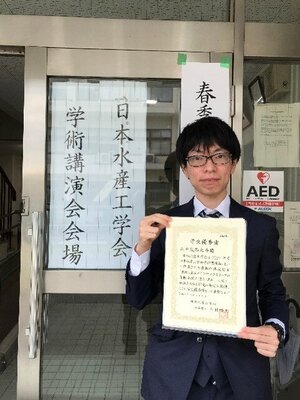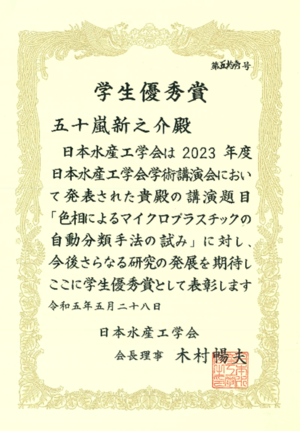Shinagawa Etchujima Campus Graduate School of Marine Science and Technology
Graduate School of Marine Science and Technology
The Graduate School of Marine Science and Technology has a doctoral course divided into a master's course and a doctoral course, and trains independent highly specialized professionals who open up cutting-edge fields.Furthermore, in collaboration with the Japan Fisheries Research and Education Agency, the Japan Agency for Marine-Earth Science and Technology, and the National Institute of Maritime, Port and Aviation Technology, we will further enhance education and research and improve the quality of graduate students. We are trying to
-

-
School of Marine Life ScienceShinagawa Campus
- Department of Marine Biological Resources
- Department of Food Production Science
- Department of Ocean Policy and Culture
-

-
School of Marine TechnologyEtchujima Campus
- Undergraduate Course of Maritime Systems Engineering
- Undergraduate Course of Marine Electronics and Mechanical Engineering
- Undergraduate Course of Logistics and Information Engineering
-

-
Faculty of Marine Resources and EnvironmentShinagawa Campus
- Department of Marine Environmental Science
- Department of Marine Resources and Energy
[Awards and Commendations] Mr. Shinnosuke Igarashi (1st year master's student) received the Student Excellence Award at the 2023 Japan Society of Fisheries Engineering Annual Conference.
Mr. Shinnosuke Igarashi, a graduate student of our university (first-year master's course majoring in Marine Resources and Environmental Studies) who participated in the 2023 Annual Meeting of the Japan Society of Fisheries Engineering held from May 5 to 27, 5 at the Faculty of Fisheries, Kagoshima University (Kagoshima City), received the Student Excellence Award.The award is given by the Japan Society of Fisheries EngineeringAwarded for outstanding general lectures given by students at academic lectures.
[Title of award-winning research]
Trial of automatic classification method of microplastics by hue
[Details of award-winning research]
In recent years, the presence of plastic waste in the ocean, especially microplastic waste (microplastics: MPs), has attracted attention as a new marine environmental problem.At present, research on MPs is being conducted in various forms, and attempts are being made to estimate the abundance of MPs in the ocean, to estimate the sources of their generation, to make future predictions, and to assess the impact on marine ecosystems.Among them, Mr. Igarashi focused on the color of MPs as one of the information necessary for estimating the source, and attempted to automate the classification using Python.
<Related links>
Japan Society of Fisheries Engineering Homepage






